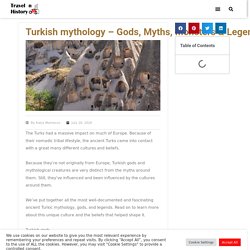

Legends of Turkey: Sarıkız. Once upon a time, there was a beautiful girl with shiny blonde hair that ran down her shoulders and sweet hazel eyes which sparkled at night.
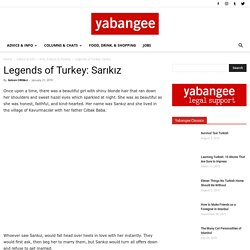
She was as beautiful as she was honest, faithful, and kind-hearted. Her name was Sarıkız and she lived in the village of Kavurmacılar with her father Cılbak Baba. Whoever saw Sarıkız, would fall head over heels in love with her instantly. They would first ask, then beg her to marry them, but Sarıkız would turn all offers down and refuse to get married. One day, her father decided to go on a pilgrimage. During the father’s absence, many eligible young men tried and failed to win the affection of Sarıkız. He took his beloved daughter and a few geese, and set out to climb on the Kaz Dağı (literally the Goose Mountain) to leave her to the arms of fate. Sarıkız understood her father’s plans as with just a look she could read his heart. Years passed by and yet Cılbak Baba would still cry day and night for his beloved daughter.
Shamanism: A practice of early Turkic beliefs. History books cite that Turkic people used to practice shamanism.
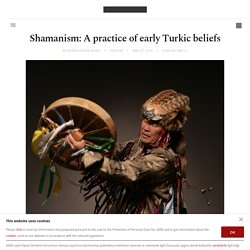
A shaman is a person with the ability to contact supernatural forces. Reminiscent of modern-day psychics, shamans would lose themselves in the state of trance through their own methods such as chanting prayers while playing a frame drum. They had special clothing, used drums or other certain instruments, danced and had knowledge of things like spirits or jinns that ordinary people cannot see or hear. Shamans are not poets at all, but their prayers are generally in the form of a poetry that contains meaningless but magical words. Shamans were tribe' medicine men rather than men of religion we see in the Western religions. Sport in Turkey in the Pre-Islamic Period – The Sport Journal. Submitted by: Ergun Yurdadon, United States Sports Academy This paper is a descriptive historical analysis of sport in Turkey from the earliest available records to the present.
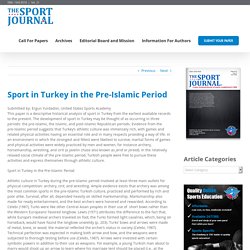
The development of sport in Turkey may be thought of as occurring in three periods: the pre-Islamic, the Islamic, and post-Islamic Republican periods. Evidence from the pre-Islamic period suggests that Turkey’s athletic culture was immensely rich, with games and related physical activities having an essential role and in many respects providing a way of life.
Turkish Literature. Turkish belongs to the Altay branch of the Ural-Altay linguistic family.
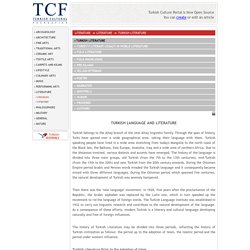
Through the span of history, Turks have spread over a wide geographical area, taking their language with them. Turkish speaking people have lived in a wide area stretching from today's Mongolia to the north coast of the Black Sea, the Balkans, East Europe, Anatolia, Iraq and a wide area of northern Africa. Due to the distances involved, various dialects and accents have emerged. The history of the language is divided into three main groups, old Turkish (from the 7th to the 13th centuries), mid-Turkish (from the 13th to the 20th) and new Turkish from the 20th century onwards. During the Ottoman Empire period Arabic and Persian words invaded the Turkish language and it consequently became mixed with three different languages. Then there was the "new language" movement. Turkish Literature Prior to the Adoption of Islam.
Turkic mythology. Beliefs related to the nomadic existence of the Turkic peoples The 10th-century Irk Bitig or "Book of Divination" of Dunhuang is an important source for early Turkic mythology Irk Bitig, a 10th-century manuscript found in Dunhuang is one of the most important sources for Turkic mythology and religion.
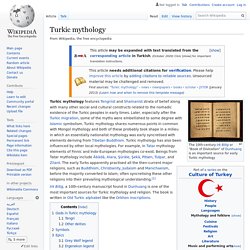
The book is written in Old Turkic alphabet like the Orkhon inscriptions. Gods in Turkic mythology[edit] İye are guardian spirits responsible for specific natural elements. Tengri[edit] Turkishmythology. Mustafa Kemal ATATURK (all rights reserved) Akana is a goddess.
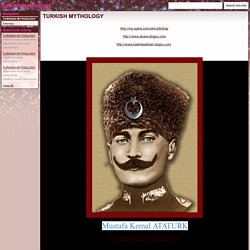
Akana is give order creation to god Ülgen. Ülgen is a god. Ülgen administers to celestial body. Karahan is Ülgen's father. Kızagan is Ülgen's son. Mergen is Ülgen's son. Gods and Goddesses in Turkish Mythology. Tag: healthy Turkish vegetarian dishes. Baked zucchini (courgette), peppers, onion and garlic in tomato sauce – Firin Sebze This baked vegetables in tomato sauce with olive oil, Firin Sebze, is a delicious, easy and healthy vegetarian course that we turn to often.

Beauty of this dish is that you can use whatever vegetables you have in hand; zucchini (courgettes), peppers, onions, peas, carrots, beetroots, aubergines, beans, potatoes especially work well. In Turkish cuisine, we use tomato based sauces a lot in our casseroles, stews and baked dishes; you can use juicy, ripe tomatoes when they are in season. If you can’t get hold of ripe tomatoes, a good quality canned chopped tomatoes also work very well. For a more substantial vegetarian course, you can add cooked chickpeas to the vegetable mixture here and bake all together. You can prepare this dish ahead of time and keep in the fridge or freezer. Baked vegetables with olive oil in tomato sauce; easy, healthy and gluten-free. Gods and Goddesses in Turkish Mythology.
Turkish mythology - Gods, Myths, Monsters & Legends - Travel n History. Turkish mythology – Gods, Myths, Monsters & Legends The Turks had a massive impact on much of Europe.
